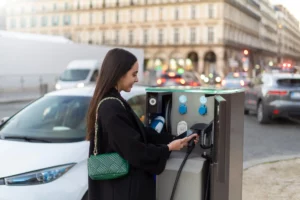
Home / EV Charging News / The Transition to Electric Cars and the Role of Legacy Automakers: Analyzing how traditional automakers are adapting to the electric vehicle market and the challenges and opportunities they face in the transition
As the world moves towards a greener future, the transition to electric cars has gained significant momentum. This article aims to analyze how traditional automakers are adapting to the electric vehicle (EV) market and the challenges and opportunities they face in this transition. We will explore the efforts made by legacy automakers, their strategies, and the impact of these changes on the automotive industry.
The growing concerns about climate change, depleting fossil fuel reserves, and advancements in battery technology have fueled the rise of electric cars. EVs offer a sustainable transportation solution with zero tailpipe emissions. As a result, there has been a surge in consumer demand for electric vehicles.
Recognizing the shifting market dynamics, legacy automakers have started embracing electrification. They have realized the need to transition from internal combustion engines (ICE) to electric powertrains. Several major automakers have announced ambitious plans to electrify their vehicle lineups, investing heavily in research and development to stay competitive.
Despite their efforts, legacy automakers face numerous challenges in the transition to electric cars. One of the significant hurdles is the restructuring of their manufacturing processes. Shifting from the production of traditional ICE vehicles to EVs requires substantial changes in assembly lines, supply chains, and workforce training.
Another challenge is the establishment of a reliable charging infrastructure. Legacy automakers need to collaborate with governments and other stakeholders to build an extensive network of charging stations to alleviate range anxiety and encourage mass adoption of electric vehicles.
The transition to electric cars also presents significant opportunities for legacy automakers. By embracing electric mobility, they can tap into a growing market segment and cater to environmentally conscious consumers. EVs offer automakers the chance to differentiate their brands, enhance their reputation, and attract new customers.
Moreover, electric vehicles require fewer components and have simpler drivetrains compared to traditional ICE vehicles. This simplification presents opportunities for automakers to reduce production costs, improve efficiency, and explore new revenue streams in areas such as energy storage and vehicle-to-grid technologies.
To stay competitive in the electric vehicle market, legacy automakers are investing in innovations and forming strategic partnerships. They are heavily focused on developing advanced battery technologies to enhance the range, charging speed, and durability of their EVs. Additionally, collaborations with tech companies and startups enable automakers to leverage expertise in areas like autonomous driving and connectivity.
The transition to electric cars has far-reaching implications for the entire automotive industry. It is reshaping the competitive landscape, with new players entering the market and disrupting traditional business models. Legacy automakers must adapt swiftly to avoid losing market share to nimble electric vehicle startups.
Furthermore, the shift to electric mobility has implications for the global energy sector. As more EVs hit the road, there will be a surge in demand for electricity, necessitating investments in renewable energy sources and smart grid infrastructure.
The transition to electric cars isinevitable, and legacy automakers are making significant efforts to adapt to this change. They are embracing electrification, investing in research and development, and restructuring their manufacturing processes. However, they also face challenges such as establishing a charging infrastructure and retraining their workforce.
Despite the challenges, the transition to electric cars presents numerous opportunities for legacy automakers. They can tap into a growing market segment, enhance their brand reputation, and explore new revenue streams. Innovations in battery technology and strategic partnerships with tech companies are crucial in staying competitive in the evolving automotive industry.
The impact of the transition extends beyond the automakers themselves. It reshapes the competitive landscape, encourages renewable energy investments, and drives the need for smart grid infrastructure.
In conclusion, the journey towards electric cars represents a transformative period for legacy automakers. By embracing this shift, they can position themselves as key players in the sustainable transportation revolution while addressing the challenges and leveraging the opportunities it presents.
